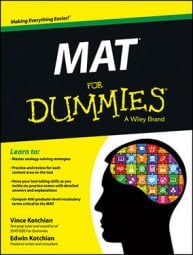Word roots provide clues to a word’s definition; knowing word roots can help you tremendously on the MAT (Miller Analogies Test). A word root is a basic unit of a word that contains the most important part of its meaning. For example, the root circum means “around” and is the root of words like circumference and circumvent, both of which have to do with going around something.
When studying word roots, it can be useful to make up a memory device that will help you remember the meaning of the root. Try the following method:
Write down the word root and its definition on a piece of paper.
The act of writing helps you remember.
Below the word root, write a word that uses that root.
For example, for the root JECT you might write the word INJECT.
Make a creative sentence using the word containing the root.
The most memorable sentences are ones that make you imagine something and react emotionally. For example, “I drank so much coffee while studying that I felt as though I’d been given a caffeine INJECTION.”
Since there are exceptions to every rule in English, you can’t be 100% sure a word means what its root would normally indicate. However, roots work often enough to help you if you otherwise don’t know what a word might mean.
The following list is a collection of common English word roots.
ACT: Do; actuate: put into action
ALTER: Other; alternate: change in turn
AM: Love; amative: loving
ANIM: Mind, spirit; animism: belief in the soul
ANNU: Year; annual: yearly
ARCH: Ruler; archangel: principal angel
AUTO: Self; autograph: one’s signed name
BELL: War; belligerent: someone who began a conflict
BEN: Good; benefaction: a good act
CAD: Fall; cadaver: a deceased human body
CAPIT: Head; capitol: the primary building used by government
CEED: Go; exceed: go past expectations
CHRONO: Time; chronograph: stopwatch
CIS: Cut; incision: a cut
CLAIM: Shout; exclaim: shout out
CRED: Believe; credence: a belief
CUR: Run; curator: someone who runs a museum
DEM: People; demagogue: a crowd-pleasing speaker
DIC: To say; dictator: unquestionable leader
DOC: Teach; document: a written statement
DUC: Lead; conductor: driver of a train
EU: Well; eupepsia: digestion that works well
FAC: To make; factotum: someone who does different works
FER: Carry; ferry: vessel that carries people across water
FIN: End; finale: end of a show
FLECT: Bend; reflect: to mirror
FORT: Luck; fortitude: ability to withstand hardship
FRAG: Break; fragile: breaks with ease
GEN: Race; genocide: the killing of a specific people
GRESS: Step; progress: moving ahead
JECT: Throw; inject: to put into
LEG: Choose; legible: able to be read
LOG: Speech; epilogue: written at the end of a book
LUM: Light; luminescence: giving off light
MAG: Big; magnum: a large handgun
MAL: Bad; malice: an evil deed
MIT: Send; transmit: to send from one to another
MORPH: Shape; metamorphic: rock that has changed forms
MUT: Change; mutate: to change forms
NAT: Born; natal: relating to someone’s birth
NOM: Name; nominate: to give a name for an election
NOV: New; novice: someone new to a skill
OMNI: All; omnivorous: eats plants and animals
PATH: Feel; empathetic: understanding another’s feelings
PED: Foot; pedicure: the beautification of the feet
PHIL: Love; philander: flirt
PORT: Carry; porter: someone who carries luggage
RID: Laugh; ridicule: to make someone appear laughable
SCI: Know; conscious: being aware
SCRIB: Write; inscribe: to write
SENS: Feel; sensation: a psychological feeling
SOL: Loosen; dissolve: separate into smaller parts
SPEC: Look; spectacles: eyeglasses
TAIN: Hold; abstain: to avoid doing
TRACT: Pull; attraction: feeling drawn to something
VEN: Come; convention: a gathering where people come to meet
VER: Truth; veracity: truthfulness
VIS: See; visor: part of hat that keeps light out of eyes
VIV: Life; vivify: bring life to
VOC: Call; vociferate: to shout
VOL: Wish; volition: an act of free choice

